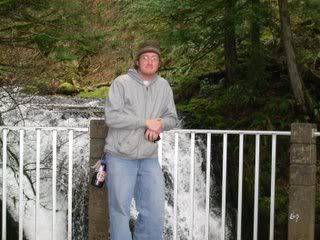Monday, October 09, 2006
| Honored Readers, "Top" Friends, Guests and Subscription Holders, thank you for coming to this blog, all protocols observed. Okay, that first bit may only be funny if you've ever sat through the incredulously formal beginnings to a Ugandan meeting of almost any sorts (including, for a while, until we explained the differences, the weekly staff wrap-ups we held in the office.) This last Sunday gave me the opportunity for a gathering where even that type of formality, however, might have seemed appropriate. Some of the staff and I took advantage of a trip down to To my immediate left and right were two brothers from Fort Portal, nephews to the Minister of Ethics, who were invited (almost entirely through the strength of that connection, I would imagine) to the reception to sing various songs. The two brothers combined to form an amazing duo, one mostly played guitar and sang some form of harmony while the other sounded off in a nice deep voice at times, but at other times slipped into one of his on-stage personas as the African Elvis. (I would have dearly loved to see the Elvis bit, but sadly it's not being performed anywhere in But for all the moments of comedy, confusion, and even boredom at the incredibly long speaches that to my Western-adjusted ears seemed to go nowhere and be about less than what occured to some of the speakers earlier that day, it was an amazing event. If just for the simple fact of looking at the paper the next day that reads "Museveni says Prayer Works" and I would think, that's right, he did, I was there. For more reasons than that, though, I was glad I was there. Listening to the speaches offered some insight into the thoughts of these leaders. Hearing presidents discuss their personal prayer life with seeming honesty and candor opened up the hopes that God had some hand in guiding their decisions and reminds me that if these men take time to seek answers from higher sources than themselves, I should dedicate more of my own time to the same. The most inspiring parts came whenever anyone would touch on the theme of the morning, Peace and Reconciliation. Although many people danced around the issue in their speeches, it could be infered that at the base of these thoughts were grave concerns about the north. If peace is to occur, it will require forgiveness, if the country will move on, they will need to have the these thoughts forefront in their minds. The attentions that the people of this country must pay to ideas like what is expressed in Matthew, in the Sermon on the Mount, where we are called to forgive others before we ourselves are forgiven. This concept takes on so much more when you considered the weight of how others have tresspassed against them. In the context of debates circling the International Criminal Courts, amnesty for war crimes, and the inspiringly forgiving nature of Acholi reintroduction rituals. In my typically American nature, I can take all of this in through slef-reflection and comparison. What do I forgive people for, not writing, sending packages, being mean, stealing, selfishness, all of these things which plague us in our basic levels and which we let ekk out of oursleves because we are so consumed with preventing the larger sins that we can neglect these smaller ones. Of all the things I have to forgive others for, most are small examples of the trials I fail at any given moment of the day. Compared to the litany of sins committed against these people it is staggering what these speakers are saying, what can and should be forgiven for real peace to occur. Even without the egocentric comparisons, it is a vast thing to hear that prayer and forgiveness are central to a nation, or should be at least. These sentiments are said, and how often meant, I'm not sure, but offered at least, and I tried to hear them through the cultural dissonance and pray in my own fashion that it was real. |
